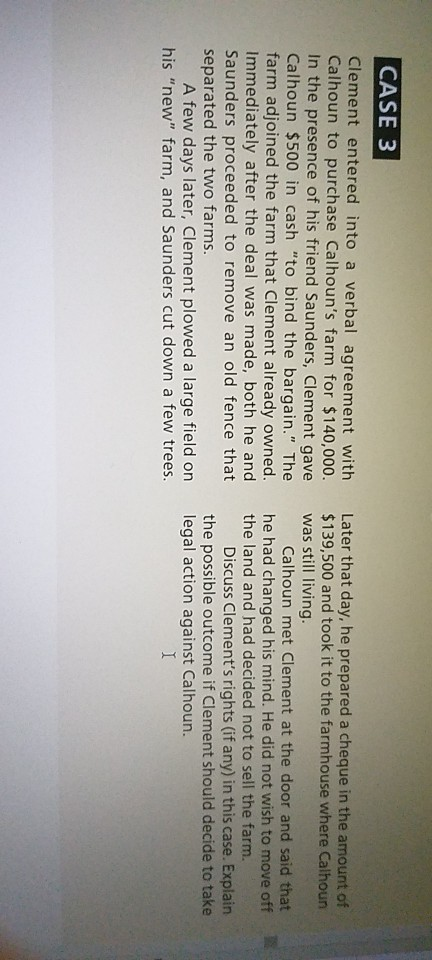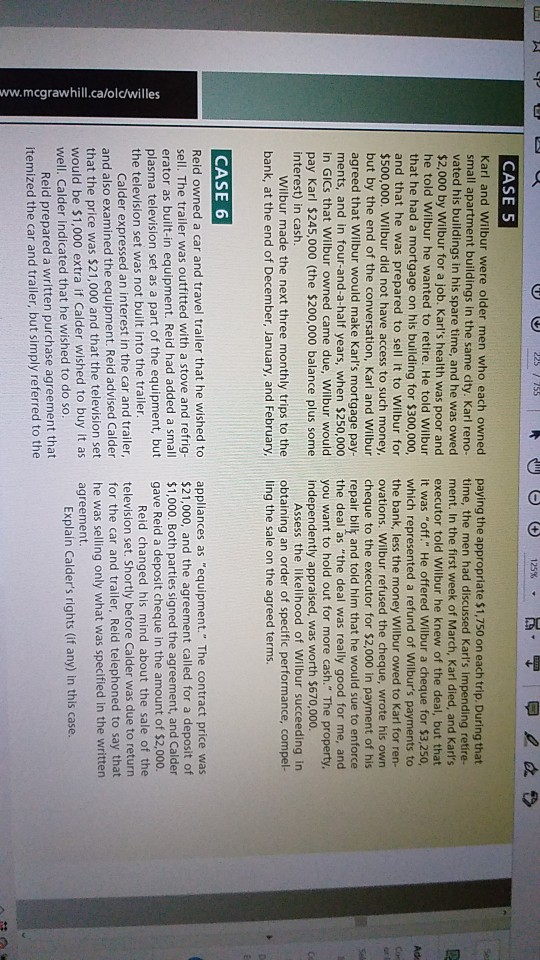Answered step by step
Verified Expert Solution
Question
1 Approved Answer
Contemporary Business Law need solution for this. CASE 1 Maria intended to open a store in a major mall. She invited Yasmin to join her



Contemporary Business Law need solution for this.
CASE 1 Maria intended to open a store in a major mall. She invited Yasmin to join her through investment and management of the operation. Yasmin agreed on the condition that she could raise the money and work it into her schedule as an assistant in an accounting firm. She did raise the money, and sent it to Maria, and on the strength of that, Maria signed the shopping centre lease agreement. When Yasmin's employer discovered her plans, it informed her that "no moonlighting" was a condition of her employment contract. Discuss the implications of this for Maria and Yasmin. CASE 3 Clement entered into a verbal agreement with Later that day, he prepared a cheque in the amount of Calhoun to purchase Calhoun's farm for $140,000. $139,500 and took it to the farmhouse where Calhoun In the presence of his friend Saunders, Clement gave was still living. Calhoun $500 in cash "to bind the bargain." The Calhoun met Clement at the door and said that farm adjoined the farm that Clement already owned. he had changed his mind. He did not wish to move off Immediately after the deal was made, both he and the land and had decided not to sell the farm. Saunders proceeded to remove an old fence that Discuss Clement's rights (if any) in this case. Explain separated the two farms. the possible outcome if Clement should decide to take A few days later, Clement plowed a large field on legal action against Calhoun. his "new" farm, and Saunders cut down a few trees. I A Ta U 225 / 755 . 125% D + Ad con CASE 5 Karl and Wilbur were older men who each owned small apartment buildings in the same city. Karl reno- vated his buildings in his spare time, and he was owed $2,000 by Wilbur for a job. Karl's health was poor and he told Wilbur he wanted to retire. He told Wilbur that he had a mortgage on his building for $300,000, and that he was prepared to sell it to Wilbur for $500,000. Wilbur did not have access to such money, but by the end of the conversation, Karl and Wilbur agreed that Wilbur would make Karl's mortgage pay- ments, and in four-and-a-half years, when $250,000 in GICs that Wilbur owned came due, Wilbur would pay Karl $245,000 (the $200,000 balance plus some interest) in cash. Wilbur made the next three monthly trips to the bank, at the end of December, January, and February, paying the appropriate $1,750 on each trip. During that time, the men had discussed Karl's impending retire- ment. In the first week of March, Karl died, and Karl's executor told Wilbur he knew of the deal, but that it was "off." He offered Wilbur a cheque for $3,250, which represented a refund of Wilbur's payments to the bank, less the money Wilbur owed to Karl for ren- ovations. Wilbur refused the cheque, wrote his own cheque to the executor for $2,000 in payment of his repair billy and told him that he would sue to enforce the deal as "the deal was really good for me, and you want to hold out for more cash." The property, independently appraised, was worth $670,000. Assess the likelihood of Wilbur succeeding in obtaining an order of specific performance, compel- ling the sale on the agreed terms. www.mcgrawhill.ca/old/willes CASE 6 Reid owned a car and travel trailer that he wished to sell. The trailer was outfitted with a stove and refrig- erator as built-in equipment. Reid had added a small plasma television set as a part of the equipment, but the television set was not built into the trailer. Calder expressed an interest in the car and trailer, and also examined the equipment. Reid advised Calder that the price was $21,000 and that the television set would be $1,000 extra if Calder wished to buy it as well. Calder indicated that he wished to do so. Reld prepared a written purchase agreement that itemized the car and trailer, but simply referred to the appliances as "equipment. The contract price was $21,000, and the agreement called for a deposit of $1,000. Both parties signed the agreement, and Calder gave Reid a deposit cheque in the amount of $2,000. Reid changed his mind about the sale of the television set. Shortly before Calder was due to return for the car and trailer, Reid telephoned to say that he was selling only what was specified in the written agreement Explain Calder's rights (if any) in this caseStep by Step Solution
There are 3 Steps involved in it
Step: 1

Get Instant Access to Expert-Tailored Solutions
See step-by-step solutions with expert insights and AI powered tools for academic success
Step: 2

Step: 3

Ace Your Homework with AI
Get the answers you need in no time with our AI-driven, step-by-step assistance
Get Started


